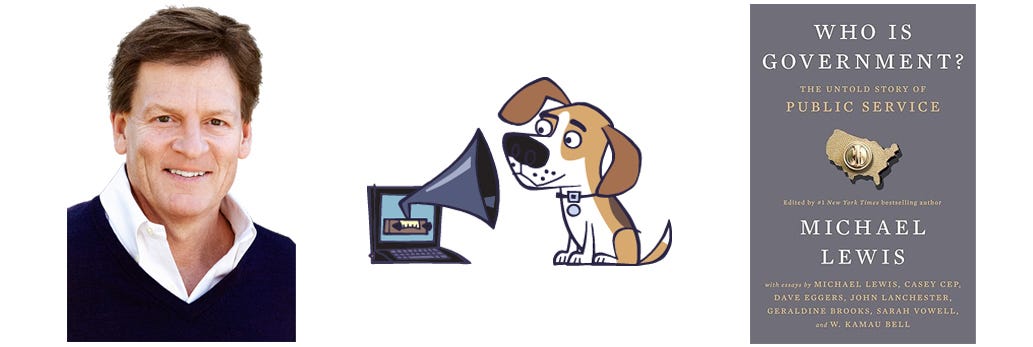Michael Lewis is the best nonfiction writer in America — and an old friend. He’s the bestselling author of Liar’s Poker, Moneyball, The Blind Side, and Flash Boys. He was on the Dishcast four years ago to discuss The Premonition: A Pandemic Story, and his new book is Who Is Government? The Untold Story of Public Service — a collection of essays by Michael and others about the federal workers now under assault by Elon Musk. Michael has a preternatural ability to sense what we want to read about when we want to read about it. This book is no exception.
For two clips of our convo — on DOGE killing effective programs, and the calculated trauma imposed on federal workers — pop over to our YouTube page.
Other topics: how civil servants forgo bigger salaries from the private sector; how they don’t take public credit; the awards known as Sammies; the guy who revolutionized mine safety; the IRS worker who fought sex trafficking; how fraud in government is actually quite small; how Trump ignores his daily briefing; his fabulist psyche; his drive for retribution; Vought and the unitary executive; scaring workers to control them; firing the inspectors general; gutting the National Weather Service; the savior culture of USAID; the bipartisan miracle of PEPFAR; how 86% of the debt is interest + entitlements + defense that DOGE can’t affect; Musk’s ignorance on basic civics; the secrecy of DOGE; the Founders’ hatred of monarchy; Trump’s tax cuts; impending inflation; “Blame Canada”; Rubio and the Khalil case; my own green card; Vance in Germany; vilifying Zelensky; the brilliance of Thatcher; Ross Perot’s run; the Clinton/Gore downsizing; Newsom’s tack to the center; the promise of Polis and Fetterman; and stories from TNR in the ‘90s.
Browse the Dishcast archive for an episode you might enjoy (the first 102 are free in their entirety — subscribe to get everything else). Coming up: Nick Denton on China’s inevitable world domination, Evan Wolfson on the history of marriage equality, Francis Collins on faith and science, Douglas Murray on Israel and Gaza, and the genius filmmaker Mike White. Please send any guest recs, dissents, and other comments to dish@andrewsullivan.com.
Here’s a listener on a recent episode:
Thanks for having Christopher Caldwell back on. I enjoy reading him, though we frequently disagree. I used to call him “my favorite far-right conservative,” though the bloom is falling off.
What I’m about to say may seem unsophisticated, but I mean it. At this point, I can fathom only three reasons a person could support Trump. If they are 1) stupid, 2) malevolent, or 3) they are ignorant of recent world history, disrespect our Constitution, and have no understanding of what has made the United States a great country.
Caldwell isn’t stupid, and I don’t think he’s malevolent. He doesn’t fit in the third category either. So I’m at a loss.
Oh, how I wish you two had had your conversation after Trump’s insane address to Congress, instead of beforehand. I would like Caldwell’s response. You danced around some issues concerning his support for Trump, and I’d have preferred it if you’d asked him plainly: “How can you justify supporting Trump? How can you believe this is worth it, or that will turn out okay in the end?”
It’s not a polite question, but it’s one I think we need to start asking. I know I’d find his answers constructive, one way or another.
A more complimentary response:
Caldwell makes a good point when he says that we base our stance on immigration mostly on impressions that we internalize over time (rather than through a study of the actual numbers involved). A few examples come to mind.
The first involves a trip I made to NYC in the early 2020s. I was more than a bit stunned to stroll through Midtown Manhattan only to find whole streets sectioned off because the sidewalks were packed full of recent arrivals with nowhere to go. Years earlier, I had stayed at the famous Roosevelt Hotel — quite a nice place right next to Grand Central Station! But the hotel had closed in the pandemic, and the building (and its surrounding neighborhood) had metamorphosed into a scene the likes of which I had never before personally witnessed.
Another incident occurred 3,000 miles away in San Diego, and maybe a year later. I went down there for a convention and, on my last day, caught a baseball game at Petco Park. When I got off the local bus, I was first confronted with what appeared to be a village of homeless migrants filling the streets that led to the stadium. On some blocks, I simply had to abandon the sidewalks (there was no room left for pedestrians) and risk traffic in the middle of the road. Again, in my own life I had almost never experienced an obvious inundation of immigrants on such a mass and obviously unmanageable scale.
But another important point is that our impressions may have largely been all we had for a while. I voted for Biden. Yet there seemed to be a discordant level of denial on the part of his administration regarding a serious problem that we could see — from the East Coast to West — with our own eyes! It wasn’t until early 2024 (as Caldwell mentions) that Biden finally took executive action to address the immigration problem that he had contributed to. And it wasn't until after the 2024 election that I finally saw in-depth reporting in the NYT that admitted that Biden had overseen what may have been the largest four-year immigration surge in our history.
I voted against Trump in 2024 — even though I had moved closer to his position on immigration. And my movement on that issue was largely due to the personal experiences I just described. The impressions that I had internalized could not be swept away by denial on the part of the Democratic Party. Politicians reject reality very much at their own peril.
Agreed. Here’s a listener on the pod with Ross Douthat:
Love the Dishcast, and that was a wonderful episode with Ross, but I was startled to hear you assert several times — with endorsement from Ross! — that life has only existed on Earth for a “tiny fraction” of its history. Pardon? The Earth is roughly 4.5 billion years old and, amazingly, has been teeming with life for nearly all of that time. The oldest fossils we have, whose very existence proves life is rather older than they, are ~3.5 billion years old. The most recent scientific estimates are that the earliest life may have arisen on Earth roughly 4.1 billion years ago — essentially the moment it cooled and solidified. It’s almost as though life were inevitable here ...
That relates to a second assertion you made several times, mostly without challenge, namely that “as far as we know,” the rest of the universe is devoid of life. Ross mildly corrected you, saying “we don’t know,” but this doesn’t quite nail it. The reality is that we can’t know, because we really haven’t begun to look. All our decades of SETI efforts are nothing against the (literally) incomprehensible vastness of the universe, in both space and time. In our galaxy alone, it’s as though we have drawn a single cup of water from all the world’s oceans and said, “Where are the fish? I guess, as far as we know, the oceans are empty.” And that’s just our own galaxy; others are at functionally impossible distances. So truly We Don’t Know, but ...
What we do know is tantalizing. The accumulating clues here on Earth and in our solar system tend much more to validate than to undermine the scientific consensus that life is likely present, and in considerable abundance, across the universe. (How much of it eventually becomes intelligent is another matter.) The fact that we can’t see it or talk to it yet, today, means nothing. Even if there were a million intelligent species in our 13-billion-year-old galaxy (never mind the billions of other galaxies), the odds of one of them being close enough in space and time to see or communicate with today are infinitesimal.
I stand corrected, but what I was trying to say is that evolved mammal life — the kind that brought us humans — is a much briefer period than earth’s entire history.
Another episode, another email:
I thank you for your conversation with Sebastian Junger weeks back. I have loved so much of his work — from the film Restrepo to the book Tribe. Recently, I rewatched a film he made about a decade ago called Which Way Is the Front Line From Here? — about his friend, photojournalist Tim Hetherington. It’s a beautiful portrait of a wonderful and inspiring man. I’m in the middle of reading (or rather listening to the audiobook of) In my Time of Dying — a great book, and your interview led me to purchase it.
I want to recommend to you another very interesting book: Life Before Life, by Dr Jim Tucker. He carried on the work of Dr. Ian Stevenson, who studied past-life memories in children. Tucker focuses on children from the West (whereas Stevenson collected stories from children in Asia), and the accounts given by Tucker are amazing — especially the case of James Leinenger, who as a child who recalled dying as a US naval pilot in WW2 in the Pacific theater. It gives me goosebumps every time I think of it. Tucker also (like Junger) tries to reconcile how consciousness could possibly survive death with quantum physics.
Here’s a fan of the Adam Kirsch pod:
Thank you for this wonderful conversation. I’m a Jewish listener who has struggled to come to terms with his own Zionism, so it’s always refreshing to hear something new and thoughtful. But even Israel’s most thoughtful and nuanced defenders (like Adam) seem to reflexively reject the notion of injustice at the heart of Israel’s founding. The corollary is a rejection of any moral obligations to the Palestinians that might result.
That’s not to say we should now unwind the Zionist project. Adam’s book speaks most powerfully to that point; you have made it several times yourself; and Hitch was firm on it even as he eviscerated the underlying ideology. But humans are almost constitutionally incapable of recognizing when they — or their causes — benefit from unfairness. Until we can learn to walk and chew gum at the same time (support Israel’s existence while also recognizing what we owe to the Palestinian people), we seem doomed to slouch toward an expulsion — destroying Palestine physically and Israel spiritually.
That process is now tragically in an advanced stage. Here’s one more listener on that episode:
Thank you for having Kirsch on to discuss settler colonialism and, in particular, its relationship to the Israeli-Palestinian conflict. I wanted to add a few points that did not come up in the episode that can give us more clarity about the differences between Zionism and settler colonialism.
First, your description of the kind of ethnic cleansing that happened in 1948 is not entirely accurate. In some cases, Arabs simply fled after a battle and surprised the Israelis themselves, who had never issued evacuation orders. In other cases, Arabs who lived in the region were not longstanding natives, but new immigrants themselves who had come to the region following its economic boom due to Jewish migration and cultivation of agricultural land. In other cases, Israel needed to attack a particular village to prevent a siege (in Jerusalem, for example); and during the attack, the people fled. In other cases, the Arab press itself overstated the events of a particular attack to brand Israelis as barbaric.
And in many cases, of course, there was forced expulsion. (Much of this is outlined well in Righteous Victims, the Benny Morris account.) And mind you, the same kind of population transfer happened the other way: some Jews left their homes during the war. This kind of movement happens all the time during war.
Some of what happened in 1948 was a result of the invading Arab armies wanting to clear certain places so that they could invade and then have the Arabs return. Sure, not as much as the rah-rah original Zionists claimed or claim, but some. Indeed, Israel accepted the 1947 partition plan — and if the Arabs had accepted it, there would have been no mass expulsion, and Jews would have been a slim bare-majority in their piece of the pie. In fact, after the war, those non-Jews who remained became full citizens of Israel with essentially the same civil rights as Jews, except in certain religious matters or in terms of military service — a very uncommon occurrence in that part of the world.
The Zionist project was, in fact, much closer to the mass immigration to the UK you described than to traditional settler colonialism. Unlike settler colonialism, there was no mother country, nor was there a desire to extract resources to provide wealth to the mother country. It was, more accurately, an actual great replacement (as opposed to the Tucker Carlson kind): a group of people were desperate to build some small majority somewhere in order to have the fate of their people in their own people’s hands. That’s why Jews were willing to accept almost anything — even the Peel Commission’s tiny coastal enclave — to have such a majority:
Similar to our current immigration debates, most of the new Jewish refugees spoke a different language, had different customs, and practiced, of course, a different religion. Many members of the Arab population didn’t want them there, and it was not originally because of self-deterministic nationalism. In fact, there was no state of Palestine; and before Zionism, there was no movement toward that. Most Palestinian Arabs were either longing to maintain the Ottoman status quo, or become part of a new pan-Arab nation, or simply just identify with their clan or town. Instead, Palestinian Arabs were driven by simple and understandable human xenophobia coupled with a fear that Jewish economic development would cause gentrification and inflate real estate prices (which it did).
And again, the population and borders in the entire Ottoman world were changing all the time after 1917, when Armenians, Greeks, Turks, Jews, Christians, and many other groups all swapped and moved and changed their “nationality” or adopted the concept of a “nationality” for the first time ever. Yasser Arafat’s family proves that: some parts were from Gaza, others Egyptian, and he himself was born in Egypt!
Today, there is a sensible solution: a Jewish-majority state for Jews and a Palestinian-majority state for non-Jews — with minority rights for all in their respective states. But you are absolutely correct that the biggest obstacle to this is religious fanatics on both sides who seem hellbent on a utopian solution.
Here’s a guest rec:
As a subscriber to both you and the Free Press, I’m really disappointed in the FP not sticking up for free speech in the case of Mahmoud Khalil, no matter how awful his opinions. You should invite Bari Weiss on the Dishcast to explain and debate.
Another rec:
Thank you for all you do to bring some sanity and independent thinking to our crazy world. I just wanted to make sure Corey Robin is on your radar for other independent thinkers. He’s an unapologetic liberal, but regularly pushes back against current orthodox “liberal” positions and provides much more nuance and historical grounding. Since the inauguration, his Facebook following has exploded, and I’m seeing him quoted by people I follow in entirely other contexts. Plenty of areas where you probably would not agree with him, but I think he’s an honest and independent voice.
Yeah I have to say his treatment of conservatism is among the least generous I’ve ever encountered.
Here’s a reader on my column addressing Trump’s address to Congress last week:
I agree with most everything you wrote in “The Bully in His Pulpit.” Beautifully written, as always. Some of your readers (like me) would be interested to hear your reaction to the Democrats’ reaction to Trump in the moment, because I personally believe that this is also a part of what is wrong with politics today. I am not attempting a “what about” here. As I said, I agree with your reaction to him; I’m just curious for your thoughts about his opponents that night.
I think I described it as lame and cringe. I’m now trying to banish those pink outfits and silly message-fans from my consciousness. Another reader on the column:
I don’t think you’re suffering from TDS, but I never did. However, you asked a question about how we, normal people, react to all the BS that comes out of our president’s mouth. My wife and I talk about this quite a bit, and the conclusion we’ve come to is somewhat of a stoic one: What can we as individuals do?
Listen to this episode with a 7-day free trial
Subscribe to The Weekly Dish to listen to this post and get 7 days of free access to the full post archives.














